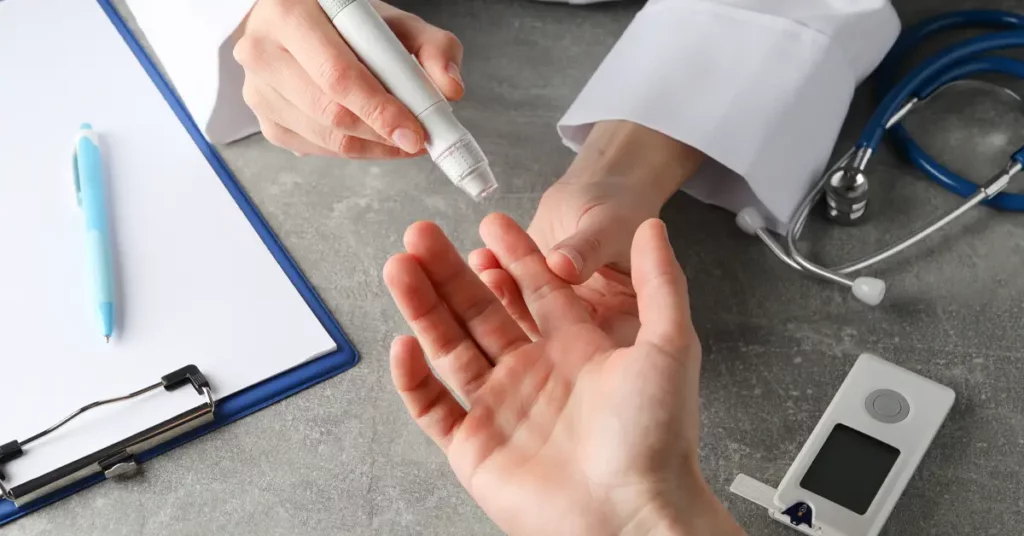In the United States, about 1.9 million suffer from type 1 diabetes, while nearly 116 million Americans suffer from hypertension. Even worse, a John Hopkins article finds that type 1 diabetes also causes hypertension.
Type 1 diabetes is a chronic condition characterized by the body’s inability to produce insulin, which regulates blood sugar levels. Meanwhile, high blood pressure, or hypertension, is when the blood flows through the arteries with too much force. The addition of hypertension in people with diabetes can be an especially deadly combination without proper and consistent care. This article will discuss the pathophysiology of type 1 diabetes and hypertension, the risk factors for developing hypertension in individuals with type 1 diabetes, and the role of healthcare providers in preventing and managing hypertension in this population.
What is The Relationship Between Type 1 Diabetes and Hypertension?
Can diabetes affect blood pressure? The short answer: yes.
Longer answer: Type 1 diabetes and hypertension have a complex relationship. Individuals with type 1 diabetes are at an increased risk of developing hypertension because of high blood sugar in the blood vessels and the cardiovascular system, as well as other factors such as insulin resistance and the use of certain medications to manage blood sugar levels.
High blood pressure can damage blood vessels and lead to complications such as stroke, heart disease, and kidney disease. Symptoms of high blood pressure may include headache, dizziness, and chest pain, although many people with high blood pressure have no obvious symptoms.
Proper blood pressure control is crucial in individuals with type 1 diabetes to reduce the risk of complications and improve overall health outcomes. Proper control may involve a combination of medications, lifestyle modifications, and regular monitoring. It is important for healthcare providers to be aware of the link between type 1 diabetes and hypertension, and to implement strategies to prevent or treat hypertension in individuals with type 1 diabetes to reduce the risk of complications.
The National Heart, Lung, and Blood Institute (NHLBI) is a division of the National Institutes of Health (NIH) that conducts and supports research on the causes, prevention, diagnosis, and treatment of heart, lung, and blood disorders.
What Are the Mechanisms by Which Type 1 Diabetes Causes Hypertension?
There are several mechanisms by which type 1 diabetes can lead to the development of hypertension:
High blood sugar levels
Chronic high blood sugar levels, also known as hyperglycemia, can have a number of negative effects on the body, including an increased risk of hypertension. High blood sugar levels can damage the blood vessels and cause inflammation, which can contribute to the development of hypertension.
Insulin resistance
People with type 1 diabetes may develop insulin resistance, which can cause an increase in blood pressure. Insulin resistance occurs when the body’s cells become resistant to the effects of insulin, leading to higher blood sugar levels and an increase in insulin production. This increase in insulin can lead to an increase in blood pressure.
Renal damage
High blood sugar levels, also known as hyperglycemia, can damage the kidneys and lead to kidney disease, which can cause hypertension. The kidneys are responsible for filtering waste products from the blood and regulating blood pressure. If the kidneys are damaged, they may not be able to function properly, which can lead to an increase in blood pressure.
Autonomic neuropathy
Damage to the nerves that control the blood vessels can increase blood pressure, and this can occur due to long-term high blood sugar levels in individuals with type 1 diabetes. It is important for individuals with type 1 diabetes to manage their blood sugar levels to help prevent nerve damage and the development of hypertension.
Medications
Some medications used to treat type 1 diabetes, such as thiazolidinediones, can cause an increase in blood pressure. Thiazolidinediones are a type of medication that help to improve the body’s sensitivity to insulin and lower blood sugar levels. However, they can also cause an increase in blood pressure as a side effect.
In addition to thiazolidinediones, other medications used to treat type 1 diabetes, such as insulin and sulfonylureas, may also cause an increase in blood pressure as a side effect. It is important to discuss the potential side effects of any medication with a healthcare provider before starting treatment.
What Are the Implications for Healthcare Providers Regarding the Role of Type 1 Diabetes in the Development of Hypertension?
The role of type 1 diabetes in the development of hypertension has important implications for healthcare providers. Here are some key points to consider:
Regular monitoring
It is important for healthcare providers to regularly monitor blood pressure in individuals with type 1 diabetes to identify and treat hypertension early on. Doing so can result to early detection, and therefore early treatment to prevent development of serious health complications.
Glycemic control
Proper glycemic control is crucial in preventing the development of hypertension in individuals with type 1 diabetes. Healthcare providers should work with their patients to manage blood sugar levels through a combination of insulin therapy, lifestyle modifications, and medications if needed.
Lifestyle modifications
Encouraging individuals with type 1 diabetes to adopt healthy lifestyle habits, such as regular physical activity and a healthy diet, can help prevent the development of hypertension. Through proper weight management, blood sugar control, and stress management, patients can experience a range of other health benefits, including reducing the risk of heart disease, stroke, and other chronic conditions.
Healthy diet
A healthy diet can help reduce the risk of developing high blood pressure and type 2 diabetes. This includes eating plenty of fruits, vegetables, whole grains, and lean proteins and limiting the intake of added sugars and sodium. Maintaining a healthy weight is also important for reducing the risk of these conditions.
Medication management
Some medications used to treat type 1 diabetes, such as thiazolidinediones, can cause an increase in blood pressure. It is important for healthcare providers to monitor blood pressure closely when prescribing these medications and consider alternative treatments if necessary. However, prescription medications can also be used to lower blood pressure and improve blood sugar control in people with high blood pressure and type 2 diabetes. These may include angiotensin-converting enzyme (ACE) inhibitors, angiotensin II receptor blockers (ARBs), and medications that help lower blood sugar levels, such as metformin. Healthcare providers need to be vigilant and follow this healthcare plan.
Education
Educating individuals with type 1 diabetes about the link between the condition and hypertension and the importance of blood pressure control can be an important aspect of managing their health and reducing the risk of complications. This can help to empower individuals to take charge of their health and make informed decisions about their treatment and management.
By addressing these factors, healthcare providers can play a crucial role in preventing and managing hypertension in individuals with type 1 diabetes.
DrKumo Remote Patient Monitoring Solution
DrKumo is a company that provides a technology-based solution for continuously monitoring patients remotely in real time. This solution is designed for managing chronic diseases, providing acute care, supporting post-operation recovery, and enabling hospital care at home. DrKumo is also URAC accredited, demonstrating a commitment to quality, transparency, and continuous improvement in the healthcare industry.
DrKumo has earned a reputation for being highly scalable and reliable.
DrKumo, offers remote patient monitoring (RPM) tools for diabetes management, including scales, glucometers, and continuous glucose monitoring (CGM) trackers, to help patients with diabetes maintain their blood sugar levels within an acceptable range. Before patients receive the equipment, they will receive thorough training on how to use it and when to use it.
By allowing patients to directly participate in monitoring their health, will promote communication and interaction between patients and doctors, creating a patient-centered environment where patients can share their concerns and doctors can provide feedback and advice, making it helpful in monitoring diabetes and hypertension.
Takeaways
Can type 2 diabetes cause hypertension? Unfortunately, yes. The relationship between type 1 diabetes and hypertension is clear – type 1 diabetes is a leading cause of hypertension, and it is important for healthcare providers to be aware of the link between the two diseases.
Research has shown that type 1 diabetes is a leading cause of hypertension in individuals. This connection is due to the body’s inability to properly process insulin, leading to higher glucose levels in the blood. Healthcare providers should be aware of this link between type 1 diabetes and hypertension and ensure that those affected are properly monitored and treated to avoid serious health complications.
Are you interested in using remote patient monitoring to manage diabetes and hypertension? DrKumo can help you. Contact us now.









